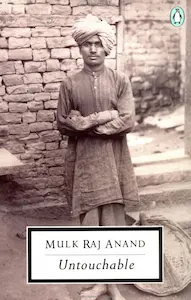Untouchable - Summary
Mulk Raj Anand

Introduction
“Untouchable” is a powerful novel written by Mulk Raj Anand, a prominent Indian author, and social activist. Published in 1935, the book sheds light on the harsh realities of the caste system in India during British colonial rule. Through the story of Bakha, a young untouchable sweeper, Anand explores the themes of discrimination, social injustice, and the struggle for human dignity. This book summary will delve into the key aspects of “Untouchable,” providing a comprehensive understanding of the narrative and its impact.
Bakha’s Struggle for Acceptance
The novel revolves around Bakha, a young boy who works as a sweeper, belonging to the lowest caste in Indian society. Bakha’s daily life is filled with humiliation and discrimination due to his untouchable status. Through vivid descriptions and poignant anecdotes, Anand portrays the dehumanizing treatment Bakha endures. For instance, when Bakha accidentally touches a high-caste man, he is berated and forced to cleanse himself in a nearby pond. These incidents highlight the deep-rooted prejudices and social divisions prevalent in Indian society.
The Influence of British Colonial Rule
Anand skillfully intertwines the narrative with the influence of British colonial rule on Indian society. The British presence exacerbates the existing caste system, as they reinforce the social hierarchy to maintain control. The author portrays this through various incidents, such as Bakha’s encounter with a British missionary who preaches equality but fails to challenge the oppressive caste system. Anand uses these encounters to critique both the British and Indian elites, who perpetuate the discrimination faced by the untouchables.
Bakha’s Quest for Education
Despite the hardships he faces, Bakha yearns for education and a better life. He dreams of breaking free from the shackles of his caste and becoming a respected member of society. Anand highlights Bakha’s determination to learn by depicting his secret visits to a missionary school. These scenes demonstrate Bakha’s resilience and his refusal to accept the limitations imposed on him by society. Through Bakha’s character, Anand emphasizes the importance of education as a tool for social upliftment and empowerment.
The Hypocrisy of the Upper Castes
Anand exposes the hypocrisy of the upper castes by contrasting their behavior with their professed religious beliefs. Despite preaching about equality and compassion, the upper castes continue to perpetuate discrimination against the untouchables. Anand effectively portrays this hypocrisy through the character of Pandit Kali Nath, a high-caste priest who treats Bakha with disdain. The author uses such characters to critique the moral bankruptcy of the upper castes and their failure to practice the values they preach.
Bakha’s Awakening
As the story progresses, Bakha’s encounters with various individuals and incidents gradually awaken his consciousness. He begins to question the social order and the injustice he faces daily. Bakha’s awakening is exemplified when he witnesses a political rally advocating for social reform. This event sparks a desire for change within him, and he becomes determined to fight against the oppressive caste system. Anand skillfully portrays Bakha’s transformation, highlighting the power of awareness and the potential for social change.
The Role of Women in “Untouchable”
Anand also explores the role of women in perpetuating or challenging the caste system. Through the character of Sohini, Bakha’s sister, the author showcases the strength and resilience of women in the face of adversity. Sohini refuses to conform to societal expectations and challenges the oppressive norms. Her character serves as a symbol of hope and resistance, inspiring Bakha and other untouchables to question their marginalized status.
The Impact of “Untouchable”
“Untouchable” had a profound impact on Indian society and its perception of the caste system. Anand’s novel brought the issue of untouchability to the forefront of public discourse, sparking conversations about social reform and equality. The book’s portrayal of the harsh realities faced by the untouchables challenged the prevailing notions of caste-based discrimination and paved the way for future activism. “Untouchable” remains a significant literary work that continues to resonate with readers, reminding them of the importance of social justice and human dignity.
Conclusion
“Untouchable” by Mulk Raj Anand is a compelling novel that exposes the deep-seated discrimination faced by the untouchables in Indian society. Through the character of Bakha, Anand highlights the dehumanizing treatment and social injustice prevalent during British colonial rule. The novel’s exploration of themes such as hypocrisy, education, and awakening offers a thought-provoking narrative that challenges societal norms. “Untouchable” remains a timeless piece of literature that continues to inspire conversations about social reform and the fight for equality.